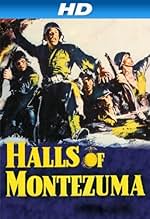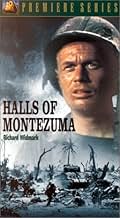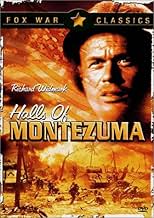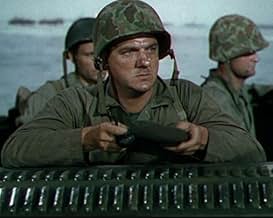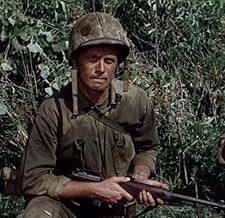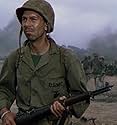IMDb रेटिंग
6.6/10
3.1 हज़ार
आपकी रेटिंग
अपनी भाषा में प्लॉट जोड़ेंA company of Marines races against the clock to find a Japanese rocket base.A company of Marines races against the clock to find a Japanese rocket base.A company of Marines races against the clock to find a Japanese rocket base.
Jack Palance
- Pigeon Lane
- (as Walter {Jack} Palance)
Richard Allan
- Pvt. Stewart
- (बिना क्रेडिट के)
Edward Binns
- First Soldier in Final Tracking Shot
- (बिना क्रेडिट के)
Robert Board
- Marine
- (बिना क्रेडिट के)
Robert Bohannon
- Soldier
- (बिना क्रेडिट के)
फ़ीचर्ड समीक्षाएं
This is one of a slew of WW2 films made in the late 40's and early 50's, some better than others. This is definitely one of the better ones. This film features a whole bunch of future stars, such as Richard Widmark, Karl Malden, Richard Boone, Jack Palance, Robert Wagner, Jack Webb and Martin Milner. Most of them hadn't completely honed their skills yet and a couple of the performances are either a bit wooden (Malden, Wagner and Webb) or overdone (Widmark). The technology is very primitive by today's standards, yet this film holds up well. The acting aside, it seems that every effort was made to make the film as realistic as it could be. In that respect, this film is much better than some of the others of the same era. There are a lot of films from this era. If you choose to watch only a few of them, make sure this is one of the few.
When it was released in 1950, "Halls of Montezuma" was one of the most realistic and ambitious war movies yet made. Today its strengths still outweigh its unfortunate flaws. The flaws are an all-too-familiar sentimental streak, an absurd "revelation" about Japanese tactics, an unconvincing psycho in a clumsy explanatory flashback, and the unlikely presence, in Lt. Anderson's platoon, of a replacement who just happened to have been one of his high-school students in civilian life.
Many viewers will find such flaws even more annoying because they detract from the good things about this movie, including some solid performances (Widmark, Palance, Boone, Webb) a realistic plot, an unusually authentic look--including some (mostly) well integrated combat footage--and a spectacular scope. Until "The Longest Day" (1961), the beach landing here(with flame-throwing tanks)and the later assault on the Japanese were more impressive than any other screen depictions of a large military operation. (BTW, the failure of the Japanese to oppose the landing itself isn't a Hollywood howler; the movie accurately reflects the Japanese defense strategy on Okinawa in 1945.) Milestone's directorial masterpiece, "All Quiet on the Western Front" (1930), expresses revulsion at the slaughter of World War I. "Halls of Montezuma" affords a more complex view of men in World War II. The hero is a high-school chemistry teacher whose migraines have addicted him to painkillers; he doesn't care because he assumes he's going to be killed. One character is blinded and another killed by accident. By modern standards such incidents may seem relatively mild, but during the war such troubling images were thought to be too disturbing for film-goers. Even in 1950 they were strong stuff for a movie.
Made at a time when the Cold War was heating up dangerously in Korea, "Halls of Montezuma" is still a revealing postwar response to World War II in the Pacific.
Many viewers will find such flaws even more annoying because they detract from the good things about this movie, including some solid performances (Widmark, Palance, Boone, Webb) a realistic plot, an unusually authentic look--including some (mostly) well integrated combat footage--and a spectacular scope. Until "The Longest Day" (1961), the beach landing here(with flame-throwing tanks)and the later assault on the Japanese were more impressive than any other screen depictions of a large military operation. (BTW, the failure of the Japanese to oppose the landing itself isn't a Hollywood howler; the movie accurately reflects the Japanese defense strategy on Okinawa in 1945.) Milestone's directorial masterpiece, "All Quiet on the Western Front" (1930), expresses revulsion at the slaughter of World War I. "Halls of Montezuma" affords a more complex view of men in World War II. The hero is a high-school chemistry teacher whose migraines have addicted him to painkillers; he doesn't care because he assumes he's going to be killed. One character is blinded and another killed by accident. By modern standards such incidents may seem relatively mild, but during the war such troubling images were thought to be too disturbing for film-goers. Even in 1950 they were strong stuff for a movie.
Made at a time when the Cold War was heating up dangerously in Korea, "Halls of Montezuma" is still a revealing postwar response to World War II in the Pacific.
- Despite it's grand name, Halls of Montezuma is a small war film. What I mean is that the movie focuses more on a small group of men and their fears and problems than it does on a grand plan for Allied victory. It's a very personal movie. We get to see these men up-close and we begin to develop feelings for them. I wouldn't doubt that this is one of the first films to show a U.S. Lieutenant so battle scarred that he resorts to using pain killers just to function. Unlike other war films of this era, not all of these men are going to make it to the end. War is like that. It doesn't pick and chose people to live because we like them. So in that regard, it's also more realistic than some other war movies made in the 50s.
- To succeed as a small, personal war movie as I've described, the cast has to be able to act. This cast does not disappoint. Richard Widmark, Jack Webb, and Karl Malden are all excellent in their respective roles. I was especially impressed with Webb who has an acting style that can grate on the nerves. He's more subdued here and it works. But as good as these three are, Jack Palance is the highlight of the movie for me. He was undoubtedly the most believable. I could really picture him doing the things in real life that were called for in the script.
- I have no difficulty recommending Halls of Montezuma to fans of war films. It's a very welcome addition to my DVD collection.
Arguably, it's one of the three or four best WWII movies ever made. A group of U.S. Marines race against the clock to find the source of enemy rockets that prevent them from taking control of a Japanese-held Pacific island. It's certainly a patriotic film. But there is also an undercurrent of despair, based on the human toll that war inevitably takes.
These Leathernecks are tough, but they are also subject to death from enemy fire. And the screen story puts a lot of emphasis on individual characterization. I don't recall a film that did such a good job of combining scene transitions with flashbacks to help viewers understand the motivations of the main characters.
Lt. Anderson (Richard Widmark) is the leader; he suffers from debilitating migraine headaches, but nevertheless pushes on to fulfill whatever dangerous mission he's assigned. One of his men is Conroy (Richard Hylton) who used to stutter, until Anderson helped cure him of it years earlier. Slattery (Bert Freed) is your typical Marine toughie, but he's got a sense of humor and conceals a portable still to make booze. Pretty Boy (Skip Homeier) is a pistol packing dude with a chip on his shoulder. Through the screen story's deep characterizations, viewers naturally become attached to these guys, and root for them as they enter into their dangerous mission. Of the dozen or so men Anderson leads, not all will make it out alive.
As in other battle films, viewers learn the importance of quick decisions, teamwork, effective communication, and keen awareness of one's surroundings. Life occurs moment by moment, in the here and now. Make a plan; execute it; dodge a problem; ignore pain and fatigue; persist. These are lessons applicable to anyone at any time, not just warriors on the battlefield.
"Halls Of Montezuma" is a quality production all the way. The color cinematography is fine, despite the fact that some of the techniques are dated. The ensemble acting is credible. The editing and scene transitions are just terrific. And, as the film's bookends, that rousing theme song: "From the halls of Montezuma to the shores of Tripoli" gets the viewer in the right frame of mind.
I normally don't care for movies in this genre. Even this film, like other WWII films, is a tad too predictable, slightly manipulative, and contains some outdated assumptions. Nevertheless, as war movies go, "Halls Of Montezuma" is one of the best.
These Leathernecks are tough, but they are also subject to death from enemy fire. And the screen story puts a lot of emphasis on individual characterization. I don't recall a film that did such a good job of combining scene transitions with flashbacks to help viewers understand the motivations of the main characters.
Lt. Anderson (Richard Widmark) is the leader; he suffers from debilitating migraine headaches, but nevertheless pushes on to fulfill whatever dangerous mission he's assigned. One of his men is Conroy (Richard Hylton) who used to stutter, until Anderson helped cure him of it years earlier. Slattery (Bert Freed) is your typical Marine toughie, but he's got a sense of humor and conceals a portable still to make booze. Pretty Boy (Skip Homeier) is a pistol packing dude with a chip on his shoulder. Through the screen story's deep characterizations, viewers naturally become attached to these guys, and root for them as they enter into their dangerous mission. Of the dozen or so men Anderson leads, not all will make it out alive.
As in other battle films, viewers learn the importance of quick decisions, teamwork, effective communication, and keen awareness of one's surroundings. Life occurs moment by moment, in the here and now. Make a plan; execute it; dodge a problem; ignore pain and fatigue; persist. These are lessons applicable to anyone at any time, not just warriors on the battlefield.
"Halls Of Montezuma" is a quality production all the way. The color cinematography is fine, despite the fact that some of the techniques are dated. The ensemble acting is credible. The editing and scene transitions are just terrific. And, as the film's bookends, that rousing theme song: "From the halls of Montezuma to the shores of Tripoli" gets the viewer in the right frame of mind.
I normally don't care for movies in this genre. Even this film, like other WWII films, is a tad too predictable, slightly manipulative, and contains some outdated assumptions. Nevertheless, as war movies go, "Halls Of Montezuma" is one of the best.
I was surprised that Halls of Montezuma was not an adapted play since a great deal of the action takes place in a cave that serves as a battalion headquarters where Colonel Richard Boone is trying to extract information from prisoners.
That in itself wasn't easy because the Japanese were not known for surrendering. Boone gives an order to try and take prisoners on this landing on an unnamed Pacific island.
Richard Widmark's company finds a few of them and it's a rough go and several members of Widmark's command die in the mission. The Japanese are firing a lot of rockets from a hill and the bombing from planes doesn't do any good. Before the big push towards that hill can be made those rockets have to be dealt with.
A lot of promising young players from 20th Century Fox were in Widmark's platoon like Robert Wagner, Jack Palance, Richard Hylton, Skip Homeier, Martin Milner. Some make it and some don't. There are several flashback sequences showing these guys in their civilian lives and earlier in the war.
At the headquarters there's also quite an assortment, Jack Webb a war correspondent, Philip Ahn an articulate Japanese prisoner who is a baseball player in civilian life and looking decidedly out of place there is the urbane Reginald Gardiner replete with cigarette holder. He's along for the ride because he's an expert on Japanese culture and psychology and speaks the language.
Halls of Montezuma is a good, not a great war film. Three performances do stand out. Karl Malden as the veterinarian now serving as a medic and career marine Bert Freed and his sergeant Neville Brand.
That in itself wasn't easy because the Japanese were not known for surrendering. Boone gives an order to try and take prisoners on this landing on an unnamed Pacific island.
Richard Widmark's company finds a few of them and it's a rough go and several members of Widmark's command die in the mission. The Japanese are firing a lot of rockets from a hill and the bombing from planes doesn't do any good. Before the big push towards that hill can be made those rockets have to be dealt with.
A lot of promising young players from 20th Century Fox were in Widmark's platoon like Robert Wagner, Jack Palance, Richard Hylton, Skip Homeier, Martin Milner. Some make it and some don't. There are several flashback sequences showing these guys in their civilian lives and earlier in the war.
At the headquarters there's also quite an assortment, Jack Webb a war correspondent, Philip Ahn an articulate Japanese prisoner who is a baseball player in civilian life and looking decidedly out of place there is the urbane Reginald Gardiner replete with cigarette holder. He's along for the ride because he's an expert on Japanese culture and psychology and speaks the language.
Halls of Montezuma is a good, not a great war film. Three performances do stand out. Karl Malden as the veterinarian now serving as a medic and career marine Bert Freed and his sergeant Neville Brand.
क्या आपको पता है
- ट्रिवियाUS Marine and Navy units participated in the filming of this movie and after their work was finished, they went to fight in Korea.
- गूफ़While speaking to his superiors on his walkie-talkie, Lt Anderson twice closes his conversation with "Over and out." This is incorrect. He should have said either "Over" (if he was turning the conversation over to the other speaker), or "Out" (if he was ending the talk). Interestingly, Anderson uses the correct term "Out" later in the film.
- भाव
Sgt. Randolph Johnson: Wasn't there a comment by your General Sherman about war?
Lt. Butterfield: Yeah, he said, "War is Hell." What did he know, that eight-ball never left the States.
- क्रेज़ी क्रेडिटCurrent prints open with the mid 1980's 20th Century Fox logo.
- कनेक्शनEdited into Tarawa Beachhead (1958)
- साउंडट्रैकMarines' Hymn
(uncredited)
Music from the "Gendarmes' Duet" from the opera "Geneviève de Brabant"
Written by Jacques Offenbach
Sung over the opening credits
Also played during the first landing
टॉप पसंद
रेटिंग देने के लिए साइन-इन करें और वैयक्तिकृत सुझावों के लिए वॉचलिस्ट करें
- How long is Halls of Montezuma?Alexa द्वारा संचालित
विवरण
- रिलीज़ की तारीख़
- कंट्री ऑफ़ ओरिजिन
- भाषाएं
- इस रूप में भी जाना जाता है
- Hasta el último hombre
- फ़िल्माने की जगहें
- Marine Corps Base Camp Pendleton, कैलिफोर्निया, संयुक्त राज्य अमेरिका(I know this, as my father was in boot camp at the time and his squad were used as extras for four days at this location, for this film.)
- उत्पादन कंपनी
- IMDbPro पर और कंपनी क्रेडिट देखें
- चलने की अवधि
- 1 घं 53 मि(113 min)
- पक्ष अनुपात
- 1.37 : 1
इस पेज में योगदान दें
किसी बदलाव का सुझाव दें या अनुपलब्ध कॉन्टेंट जोड़ें


